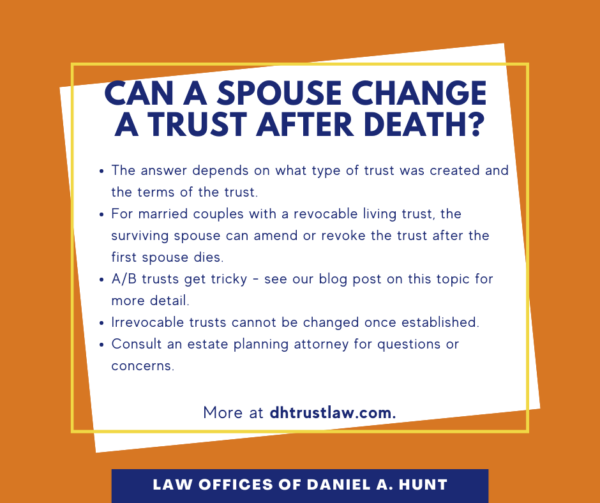Can a Spouse Change a Trust After Death?

Can a spouse change a trust after death? You might be asking this question if you’ve created an estate plan and are wondering if your spouse might make changes after your death. Or you might be a surviving spouse who wants to change your estate plan. Finally, you might be a beneficiary whose parent passed away and now you’re wondering if your step-parent can disinherit you. Whether a spouse can amend or restate a trust after death depends on what type of trust was created and the terms of the trust document.
Can a Spouse Change a Revocable Living Trust?
If a couple creates a revocable living trust together and one spouse passes away, the surviving spouse continues acting as the trustee during their lifetime. The surviving spouse still has the same power they had before their spouse’s death to amend the trust or revoke the trust.
A revocable trust becomes irrevocable when the second spouse dies. The successor trustee will take over management of the trust, but will not have the power to change it.
Can a Spouse Change an A/B Trust?
If a couple created an A/B trust, then the trust will be split into two trusts once the first spouse dies. The surviving spouse’s trust is called the “survivor’s trust”, while the deceased spouse’s trust is called the “bypass trust”. The surviving spouse can make changes to their trust, but not to the bypass trust.
However, starting in 2019, California has allowed surviving spouses to decant allocated A/B trusts. A piece of legislation called The Uniform Trust Decanting Act now allows the surviving spouse to change the terms of an irrevocable trust by “pouring” trust assets from the original trust document into a new trust.
This allows the surviving spouse to leave behind certain unwanted restrictions and provisions, just as you leave behind unwanted sediment when you decant a bottle of wine. Decanting the A/B trust would allow them to make many changes, including eliminating current or remainder beneficiaries.
But there are some restrictions to the changes the surviving spouse can make. And before they can make changes, the surviving spouse must send notice to all trust beneficiaries who can object to the suggested changes if desired. Consult with an experienced estate planning lawyer if you wish to make changes to an allocated A/B trust.
Can a Spouse Change an Irrevocable Trust?
There are also many types of irrevocable trusts. For example:
As the name implies, irrevocable trusts cannot be changed once created. Q-TIP trusts are often used by individuals who have children from a prior marriage to preserve a future inheritance for them, so if a parent used this type of trust, their children’s inheritance is likely safe.
How Can You Know the Type of Trust?
How can you know what type of trust has been created? If you’re the trust creator, your estate planning attorney should explain clearly what type of trust you’re creating and why. If you forget over the years, contact your lawyer’s office and ask them to refresh your memory.
If it’s been more than five years since you created your trust, you may wish to schedule an appointment with your trust lawyer to review your estate plan and make sure it’s still well-suited to your needs.
If you’re a beneficiary or heir who is wondering what type of trust your parent created, and they haven’t chosen to give you a copy of this document, you may need to wait until the person or people who created the trust pass away.
At that time, the successor trustee is required to send notice of the trust administration and a complete copy of the trust to each trust beneficiary. An experienced trust attorney can provide counsel if you have any concerns about your rights as a beneficiary.
If you have any questions about changing a trust after death, feel free to contact our law firm.
Law Offices of Daniel A. Hunt
The Law Offices of Daniel A. Hunt is a California law firm specializing in Estate Planning; Trust Administration & Litigation; Probate; and Conservatorships. We've helped over 10,000 clients find peace of mind. We serve clients throughout the greater Sacramento region and the state of California.




